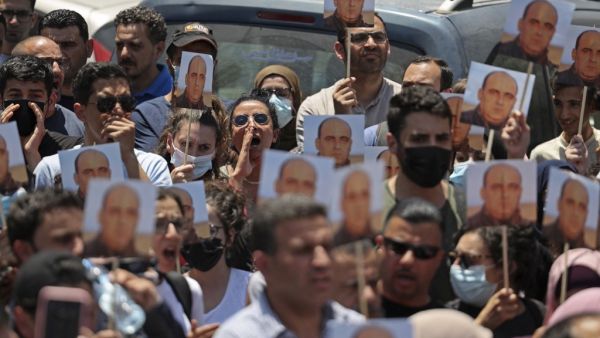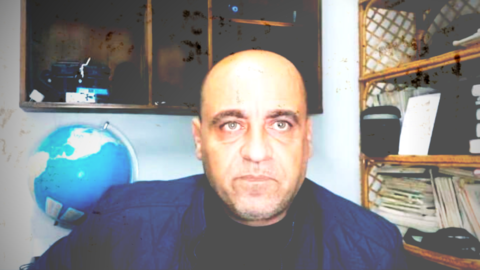Activist Nizat Banat has long been targeted by the Palestinian Authority which has been accused of corruption and security cooperation with Israeli forces.
Hundreds of Palestinians gathered in Ramallah, the seat of the Palestinian Authority, to protests against the death of prominent human rights activist Nizat Banat in police custody.
Slogans directly targeted President Mahmoud Abbas as protesters chanted “Abbas, go”, brandishing portraits of Banat.
Palestinian security forces fired tear gas, and one protester was hit in the face with a canister and hospitalised.
The Palestinian Authority got rid today of one of its fierce critics, Nizar Banat. His family testified he was severely beaten with sticks & iron objects on his head during his arrest.
— Abir Kopty (@AbirKopty) June 24, 2021
Liberation does not come in parts.. it's a whole, from our colonisers & internal oppressors. pic.twitter.com/xK3Tk9tqIC
"Enough is enough," protester Sameh Abu Awwad said in Ramallah. He described Banat as a man who had "not hesitated to speak the truth, whatever the cost."
‘An unnatural death’
The death of the human rights activist came after security forces stormed his house and violently arrested him according to his family members.
Banat's cousin, Hussein Banat said around 25 armed men had broken into the activist's house in Hebron around 3AM while he was sleeping and used pepper spray to subdue him.
"A large force entered and aggressively took off all of his clothes, then beat him for eight minutes straight," he said, then Banat was dragged to a vehicle and taken away.
According to Hebron governor Jibrin al-Bakri, during Banat's arrest, "his health deteriorated", and he was taken to hospital, where "after he was examined by doctors, he was pronounced dead."
But the initial findings from the autopsy conducted by Palestine’s Independent Commission for Human rights (ICHR) disputed the governor’s claim.
"The autopsy showed injuries represented by bruises and abrasions in many areas of the body, including the head, neck, shoulders, chest, back, and upper and lower extremities, with binding marks on the wrists and rib fractures," the ICHR said.
"The preliminary autopsy results also indicate ... an unnatural death, but determining the principal cause of death, from a clinical point of view, requires waiting for laboratory results from tissue samples," it added in a statement.
Palestinian activist Nizar Banat died after Palestinian Authority security forces arrested him early this morning. He was transferred to Hebron Hospital & pronounced dead
— لينة (@LinahAlsaafin) June 24, 2021
PA arrested Nizar many times for his outspokenness against their corruption. This is their version of events pic.twitter.com/diNdSnVFwK
Full autopsy results are expected to be released within 10 days, and will state the cause of death.
Fierce critic
43-year-old Banat was a resident of West Bank district of Hebron, and leaves behind a wife and five children
Banat was a prominent political activist and human rights defender. He used to share outspoken videos on social media, publicly criticising the Palestinian Authority over endemic corruption and its security cooperation with the Israeli occupation forces in West Bank. His Facebook page where he shared his critiques was widely followed by around 114,000 users.
The Palestinian Authority was established following the 1993 Oslo Accord and initially, it was meant to be an interim government until the establishment of a sovereign Palestinian state.
But as the Israeli occupation expanded its occupation over Palestinian territories, the two-state solution only exists on paper. Meanwhile, Palestinian Authorities with limited control and sovereignty in the parts of the West Bank have been accused by Palestinians of being an arm of the Israeli occupation due to its cooperation with Israel.
They allege that the Palestinian Authority is in constant touch with the Israeli army and they allow Israelis to conduct raids and arrest Palestinians in West Bank.
As a former member of the Fatah movement, the ruling party of the Palestinian Authority, Banat has criticised this cooperation that has done nothing but expand Israeli control over Palestinians.
"They beat him continuously for eight minutes. If you came to arrest him, take him. Why the brutality?"
— TRT World (@trtworld) June 25, 2021
Palestinians protest against President Abbas after death of Nizat Banat https://t.co/PYukYvDe1O
And his fierce criticism of President Abbas quickly made him a target and he has been imprisoned by the Palestinian Authority eight times. Banat was also campaigning for upcoming elections as a candidate from the Freedom and Dignity list.
The elections were scheduled for May but were postponed by President Abbas who cited Israeli violations of Palestinians’ voting rights in occupied East Jerusalem. For some Palestinians though, the move is seen as an excuse for Abbas to avoid the election and hold on to power as his popularity is immensel diminished.
'Dark day'
UN Middle East peace envoy Tor Wennesland said the "perpetrators must be brought to justice", while the EU called for a "full, independent and transparent investigation."
Amnesty International said Banat’s brutal arrest and death “raises serious alarms”.
Palestinians chanting “your blood won’t be in vain,” during Nizar Banat’s funeral in occupied Hebron.
— Mohammed El-Kurd (@m7mdkurd) June 25, 2021
Calls for the PA to conduct “a thorough investigation” on itself are futile. There is no enigma in how or why Nizar was assassinated. Abbas must resign. pic.twitter.com/4A9kPvCcMF
Farid al-Atrash, from the Palestinian rights group the Independent Commission for Human Rights, said Banat's death marked "a dark day in the history of the Palestinian people."
For Omar Shakir of Human Rights Watch, his death in PA police custody is “no anomaly”.
“PA security forces have for years systematically arbitrarily arrested, mistreated and tortured critics and dissidents," Shakir said.
"They hit him on his head with iron bars, which they had used to open the windows," Banat's cousin, Hussein, said.
"They beat him continuously for eight minutes. If you came to arrest him, take him. Why the brutality?"
This article has been adapted from its original source.









